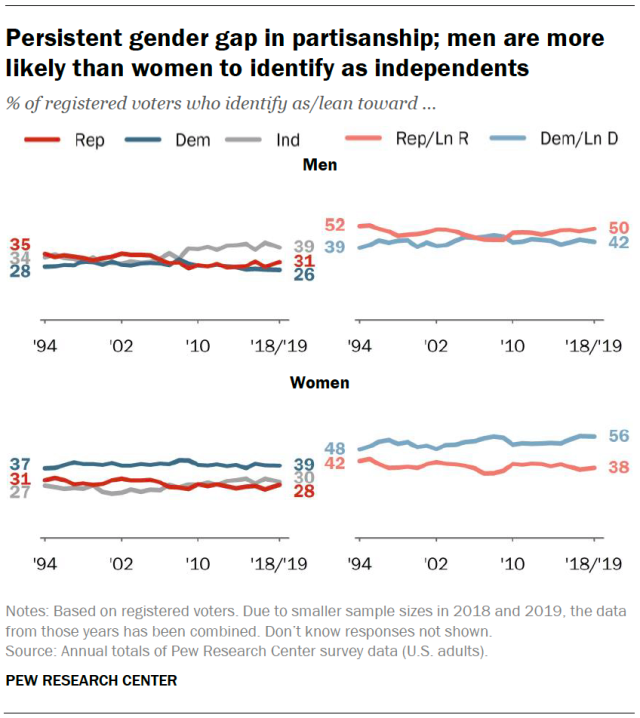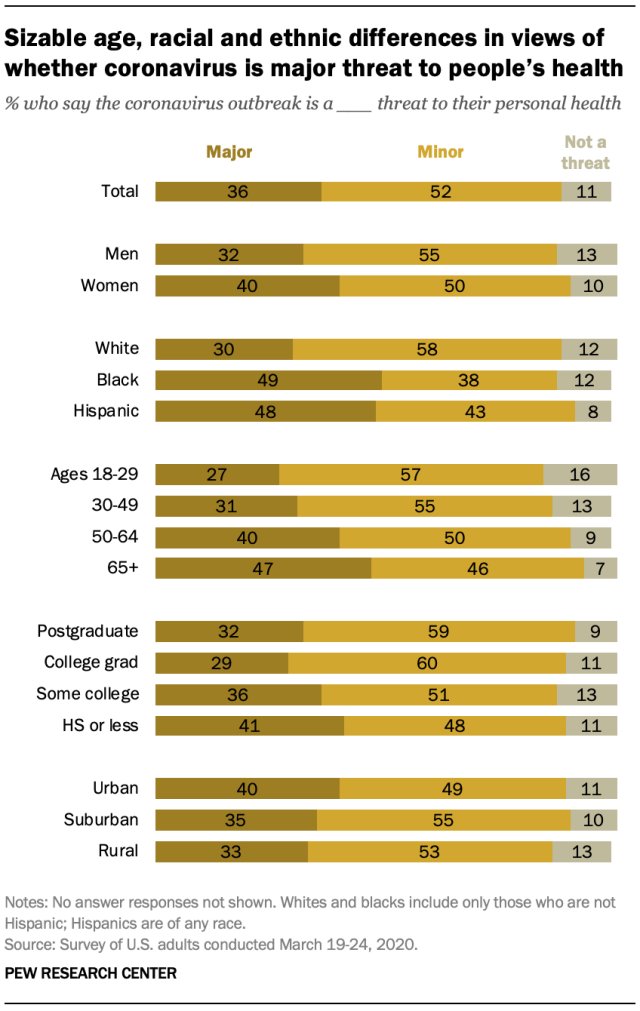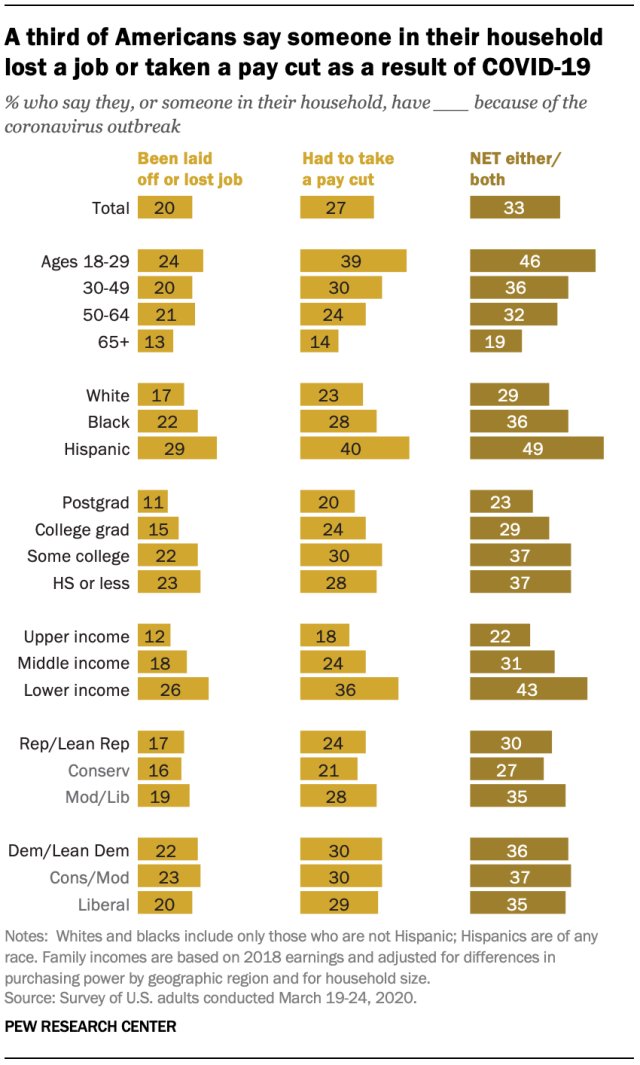A look at today's wide-ranging @pewscience report on #climatechange, #energy and #environment.
Partisan gaps continue to loom large, but survey goes deep on generations showing how #GenZ, #Millennials stand out for engagement on climate
@pewresearch 1/x
pewrsr.ch/2Svrbb3
Partisan gaps continue to loom large, but survey goes deep on generations showing how #GenZ, #Millennials stand out for engagement on climate
@pewresearch 1/x
pewrsr.ch/2Svrbb3
Climate change is viewed as an issue that needs attention today and majorities view government, industry -- and even 'ordinary Americans' -- as doing 'too little' to help reduce its effects.
2/x
2/x

Americans continue to prioritize alternative energy development (like wind and solar) over fossil fuels, but public is roughly divided over phasing out gas-powered cars by 2035; opposes eliminating fossil fuels from energy picture altogether
3/x
3/x

Youngest generations are most open to break with fossil fuels. For example, 56% of #GenZ, 57% of #Millennials favor phasing out production of gas-powered cars by 2035. Gen X and Boomer and older oppose this idea. @pewresearch
4/x
4/x

Array of policies to reduce #climatechange impacts remain popular with public. Including policies -- like tax credits for carbon capture and storage -- that receive bipartisan support.
5/x

5/x


More favor than oppose components of Biden infrastructure proposal - like spending to build EV charging network - that aim to consider climate impacts in work.
6/x
6/x

Mixed assessments of Biden's overall approach on #climatechange. Share of Americans who think he will:
▪️ Not go far enough (41%)
▪️ Go too far (29%)
▪️ Be about right (28%)
Narrow majority of Dems (54%) think he won't go far enough; 60% of Reps think he'll go too far.
7/x
▪️ Not go far enough (41%)
▪️ Go too far (29%)
▪️ Be about right (28%)
Narrow majority of Dems (54%) think he won't go far enough; 60% of Reps think he'll go too far.
7/x

Some forms of political engagement - like voting - skew older. But #GenZ (32%), #Millennials (28%) more likely than older adults to have taken at least 1 of 4 actions to help address #climatechange within last year @pewresearch
8/x
8/x

#climatechange plays more prominent role in lives of younger adults. #GenZ and #Millennials report talking more about the need for action on climate and are more likely than older adults to say they've been personally encouraged to get involved.
9/x

9/x


Yes, younger are more likely than older to be on social media.
But when controlling for social media use, #GenZ and #Millennials still significantly more likely to engage with #climatechange content online than #GenX and #BabyBoomer and older adults
10/x
But when controlling for social media use, #GenZ and #Millennials still significantly more likely to engage with #climatechange content online than #GenX and #BabyBoomer and older adults
10/x

Among social media users, share who say it made them feel 'anxious about the future' the last time they saw content about #climatechange online:
▪️ #GenZ: 69%
▪️ #Millennials: 59%
▪️ #GenX: 48%
▪️ #BabyBoomer+ 41%
11/x
▪️ #GenZ: 69%
▪️ #Millennials: 59%
▪️ #GenX: 48%
▪️ #BabyBoomer+ 41%
11/x

Generational patterns in views of climate and energy are not simply reflection of greater Democratic orientation of younger adults.
For example, *among Dems* #GenZ and #Millennials more open to break with fossil fuels than older Dems
12/x
For example, *among Dems* #GenZ and #Millennials more open to break with fossil fuels than older Dems
12/x

Within #GOP, GenZ and Millennials are more likely than older Republicans to say an array of actors - including businesses and energy industry - are doing 'too little' to help reduce effects of climate change.
@pewscience
13/x
@pewscience
13/x

Younger Republicans more likely than older to say federal government is doing 'too little' across range of environmental concerns.
But as is often case, gaps within #GOP smaller than partisan gaps between Reps and Dems more generally
14/x
But as is often case, gaps within #GOP smaller than partisan gaps between Reps and Dems more generally
14/x

Asked about priorities for climate policies, partisans cite differing considerations:
▪️ Majorities of Dems say protecting enviro for future gens, helping low-income communities are very important
▪️ Majorities of Reps cite increasing econ growth; keeping consumer costs low
15/x
▪️ Majorities of Dems say protecting enviro for future gens, helping low-income communities are very important
▪️ Majorities of Reps cite increasing econ growth; keeping consumer costs low
15/x

Report finds lower-income as well as Black and Hispanic adults are especially likely to say their community has moderate or big problems with environmental problems, such as waste and air and water pollution.
16/x
16/x

Big demographic and partisan differences in the shares who say it's 'very important' that proposals on #climatechange help lower-income communities.
17/x
17/x

On broader conversations about #climatechange, 54% of Americans say climate scientists have 'too little' influence on policy debates.
Younger adults are especially likely to express this view.
@pewscience
18/x
Younger adults are especially likely to express this view.
@pewscience
18/x

A lot more in today's @pewscience report on #climatechange, #energy and #environment. Take a look for yourself! pewrsr.ch/2Svrbb3
@pewresearch #scicomm
19/19
@pewresearch #scicomm
19/19
• • •
Missing some Tweet in this thread? You can try to
force a refresh










